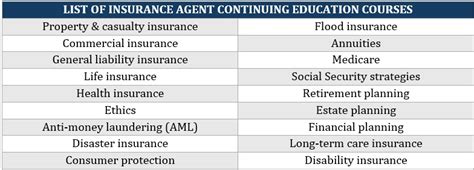Insurance Training

In the ever-evolving landscape of the insurance industry, continuous learning and professional development have become pivotal for agents and brokers to stay ahead of the curve. Insurance training plays a crucial role in empowering industry professionals with the knowledge and skills needed to navigate complex insurance products, regulations, and evolving consumer needs. This comprehensive guide delves into the world of insurance training, exploring its significance, key components, and the transformative impact it has on the industry.
The Significance of Insurance Training

Insurance training serves as the cornerstone for fostering a competent and knowledgeable workforce within the insurance sector. It equips professionals with the expertise to understand intricate insurance policies, identify client needs, and provide tailored solutions. In an industry characterized by constant regulatory updates and evolving market dynamics, staying abreast of the latest trends and best practices is essential for success.
Moreover, insurance training goes beyond mere compliance with industry standards. It fosters a culture of excellence, encouraging professionals to embrace a client-centric approach and deliver exceptional service. By investing in comprehensive training programs, insurance companies can enhance their brand reputation, attract top talent, and ultimately, drive business growth.
Key Components of Insurance Training

Insurance training encompasses a wide array of topics and skills, tailored to meet the diverse needs of insurance professionals. Here’s an overview of the key components that form the backbone of effective insurance training programs:
Product Knowledge
At the heart of insurance training lies a deep understanding of insurance products. Professionals undergo comprehensive training on various insurance offerings, including life, health, property, and casualty insurance. This training equips them with the ability to explain policy features, benefits, and exclusions, enabling them to provide accurate advice to clients.
Regulatory Compliance
The insurance industry is highly regulated, with strict guidelines and compliance requirements. Insurance training ensures that professionals are well-versed in the latest regulatory updates, helping them navigate complex legal landscapes. By staying compliant, insurance companies can mitigate risks and maintain their integrity.
Sales and Communication Skills
Effective communication is a cornerstone of success in the insurance industry. Insurance training programs focus on honing professionals’ sales and communication skills, enabling them to build strong client relationships and deliver persuasive presentations. This includes mastering active listening, empathy, and the ability to tailor insurance solutions to individual client needs.
Risk Assessment and Management
Insurance professionals play a critical role in assessing and managing risks. Insurance training equips them with the tools and knowledge to identify potential risks, evaluate their impact, and develop effective mitigation strategies. This component is essential for ensuring that clients receive appropriate coverage and protection.
Ethical Considerations
Maintaining ethical standards is paramount in the insurance industry. Insurance training programs emphasize the importance of ethical conduct, integrity, and client confidentiality. Professionals learn to navigate complex ethical dilemmas and make decisions that prioritize the best interests of their clients.
Technology Integration
The insurance industry is embracing technological advancements to streamline processes and enhance customer experiences. Insurance training includes familiarization with industry-specific software, online platforms, and digital tools. By integrating technology into their workflow, professionals can improve efficiency and provide modern, convenient services.
Continuous Professional Development
Insurance training is an ongoing process, with professionals encouraged to engage in continuous learning. This component ensures that insurance agents and brokers stay up-to-date with industry trends, emerging risks, and new insurance products. By investing in their professional development, insurance companies can retain top talent and adapt to market changes.
Performance Analysis and Industry Impact
The impact of insurance training extends beyond individual professionals, influencing the overall performance and reputation of insurance companies. Well-trained professionals contribute to improved customer satisfaction, increased sales, and enhanced risk management strategies.
Insurance training also plays a pivotal role in mitigating potential risks and reducing insurance claims. By empowering professionals with the skills to identify and address risks proactively, insurance companies can lower their exposure to costly claims and improve their overall financial performance.
Furthermore, insurance training contributes to the industry's reputation and public perception. Well-trained professionals who provide accurate advice and exceptional service can enhance the industry's credibility and trustworthiness in the eyes of consumers.
Future Implications and Industry Insights
As the insurance industry continues to evolve, the importance of insurance training becomes even more pronounced. With technological advancements, such as artificial intelligence and data analytics, shaping the industry’s future, insurance professionals must adapt and acquire new skills.
Insurance training programs are likely to integrate more technology-focused components, ensuring professionals are equipped to leverage digital tools and data-driven insights. Additionally, with the rise of remote work and digital communication, training programs may increasingly incorporate virtual and online learning modules to cater to the changing work environment.
The insurance industry is also witnessing a shift towards more personalized and tailored insurance solutions. Insurance training will need to adapt to this trend, focusing on helping professionals understand individual client needs and providing customized recommendations.
| Industry Trend | Impact on Insurance Training |
|---|---|
| Technological Advancements | Integration of technology-focused modules, ensuring professionals can leverage digital tools. |
| Remote Work and Digital Communication | Incorporation of virtual and online learning to cater to remote work environments. |
| Personalized Insurance Solutions | Focus on training professionals to understand individual client needs and provide tailored recommendations. |

How often should insurance professionals undergo training?
+Insurance professionals should ideally engage in continuous professional development, with regular training sessions to stay updated on industry changes. Annual or bi-annual training programs are common, but the frequency may vary depending on the pace of regulatory changes and emerging trends.
What are the benefits of investing in insurance training for insurance companies?
+Investing in insurance training brings several benefits, including improved customer satisfaction, enhanced risk management strategies, and increased sales. Well-trained professionals contribute to a company’s reputation and help attract and retain top talent.
How can insurance training adapt to the rise of personalized insurance solutions?
+Insurance training programs can adapt by focusing on helping professionals develop empathy and understanding of individual client needs. This involves training in active listening, tailoring recommendations, and providing personalized advice.



